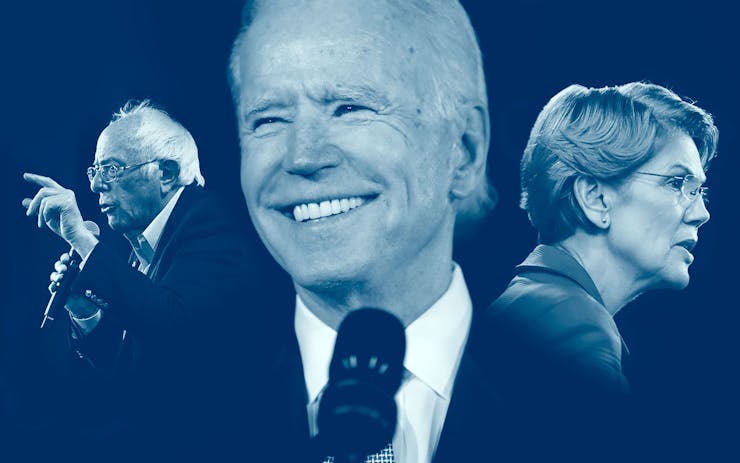This article was updated at 8:15 a.m. PST, March 4.
With a clean sweep of the American South, former Vice President Joe Biden cruised into the lead for the Democratic presidential nomination on Tuesday night, eclipsing the former frontrunner, Sen. Bernie Sanders, in the total delegate tally.
Joe Biden cruised into the lead with a Super Tuesday sweep of the American South.
Biden shot ahead with victories in Alabama, Arkansas, North Carolina, Tennessee, Virginia, Oklahoma, and Texas. He also claimed wins in Massachusetts and Minnesota.
Sanders, meanwhile, won the Democratic primaries in California, Colorado, Utah, and Vermont. Maine remains too close to call.
As of Wednesday morning, Biden led Sanders in the total delegate count, 404 to 340. (A candidate will need 1,991 of the 3,979 total pledged delegates to win the nomination.)
The end for Warren?
Sen. Elizabeth Warren ran a distant third in most contests, and even fell to fourth in a couple states behind former New York City Mayor Mike Bloomberg. The poor showing most likely will spell the end for her campaign, as she retains only 36 delegates in what’s now looking like a two-candidate race. Warren claimed 22% of the vote in Massachusetts, but even in her home state she ran third behind Biden and Sanders.
Bloomberg made a respectable showing in a number of states, notching 12 delegates and winning the vote outright in American Samoa.
On Wednesday morning, Bloomberg retired from the contest and backed Joe Biden. Warren was reported to be discussing her options with her campaign staff.
What does all this mean for cannabis legalization? Plenty.
Now it’s Biden vs. Sanders
Biden and Sanders sit at the far ends of the legalization spectrum within the Democratic Party.
Biden was a primary architect of the drug war in the 1980s and 1990s, and even today can’t bring himself to consider federal legalization. He says he’s for decriminalization instead.
Sanders, by contrast, has a long record of advocacy for legalization and drug reform. The Vermont senator has said he will end federal prohibition “on day one” by executive order. (Leafly’s David Bienenstock has written extensively on both Biden and Sanders and their policies.)
Seems pretty clear which one backs legalization
There are no guarantees in life or politics. But one candidate has explicitly promised to legalize. The other has issued a tepid statement on an issue he doesn’t care to discuss.
We’ve heard two main arguments in each candidate’s favor. Because of his explicit “day one” promise, Sanders would certainly kick-start the process of federal legalization. Those who back Biden argue that the former Delaware senator has the backroom bargaining skills—unlike Sanders—to hammer out a deal with Congressional Republicans to at least pass a half-measure like the STATES Act.
Arguments against? Sanders’ critics say the maverick Vermonter doesn’t have the power or finesse to actually move a legalization measure through Congress. Biden’s critics believe he’ll simply ignore the issue for his entire term—if not actually take steps to curb the expansion of state legalization.
Voters to Bloomberg: There’s the door
Although he has enough money to stay in the race, Tuesday’s results ended the realistic hopes of perhaps the primary season’s worst cannabis candidate, Mike Bloomberg, who waged war on his own city’s citizens through the racist tactics of stop-and-frisk.
After going all-in on Super Tuesday, Bloomberg made a decent showing in a handful of states—gaining 21% of the vote in Colorado, and 15% in Texas. But the viability of his campaign has always depended on scooping up the moderate vote if and when Joe Biden drops out. And Joe Biden ain’t dropping out.
With the personal fortune he’s sunk into staff and TV ads, Bloomberg’s final ROI on his investment amounts to around $42 million per delegate.
Hear me out: Biden’s not necessarily bad for state initiatives
Currently, advocates in 13 states are vying to put either medical or adult-use legalization measures on their statewide ballot in November. Perhaps half will collect enough signatures to actually appear before voters.
Having a Democratic nominee who’s an enthusiastic supporter—or a noncommittal neutralist—of those measures could cut both ways. Sanders might rev up interest in an adult-use initiative in, say, Arizona. But his warm embrace of legalization could turn off Republicans who might otherwise vote for the liberty and personal freedom that legalization offers. In 2016, we saw plenty of Trump voters swing in favor of medical and adult-use measures.
By ignoring legalization, a Biden candidacy could do those statewide initiatives a favor by keeping them nonpartisan. A vote for legalization wouldn’t be seen as a vote for “Joe’s issue.” Because it is definitely not his issue.
To keep on top of all the developments in cannabis politics and the 2020 election, bookmark Leafly’s continually updated Election 2020 page.





